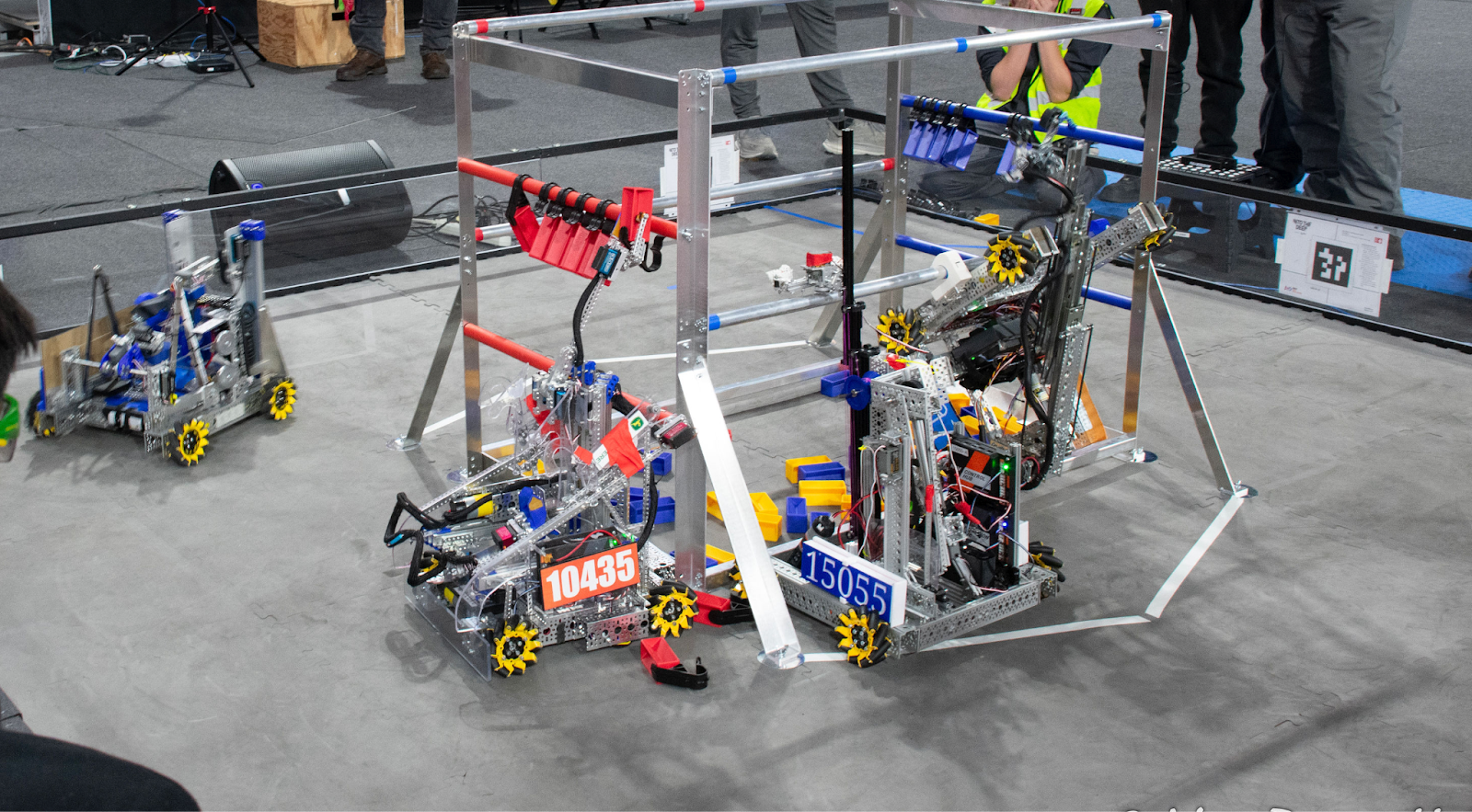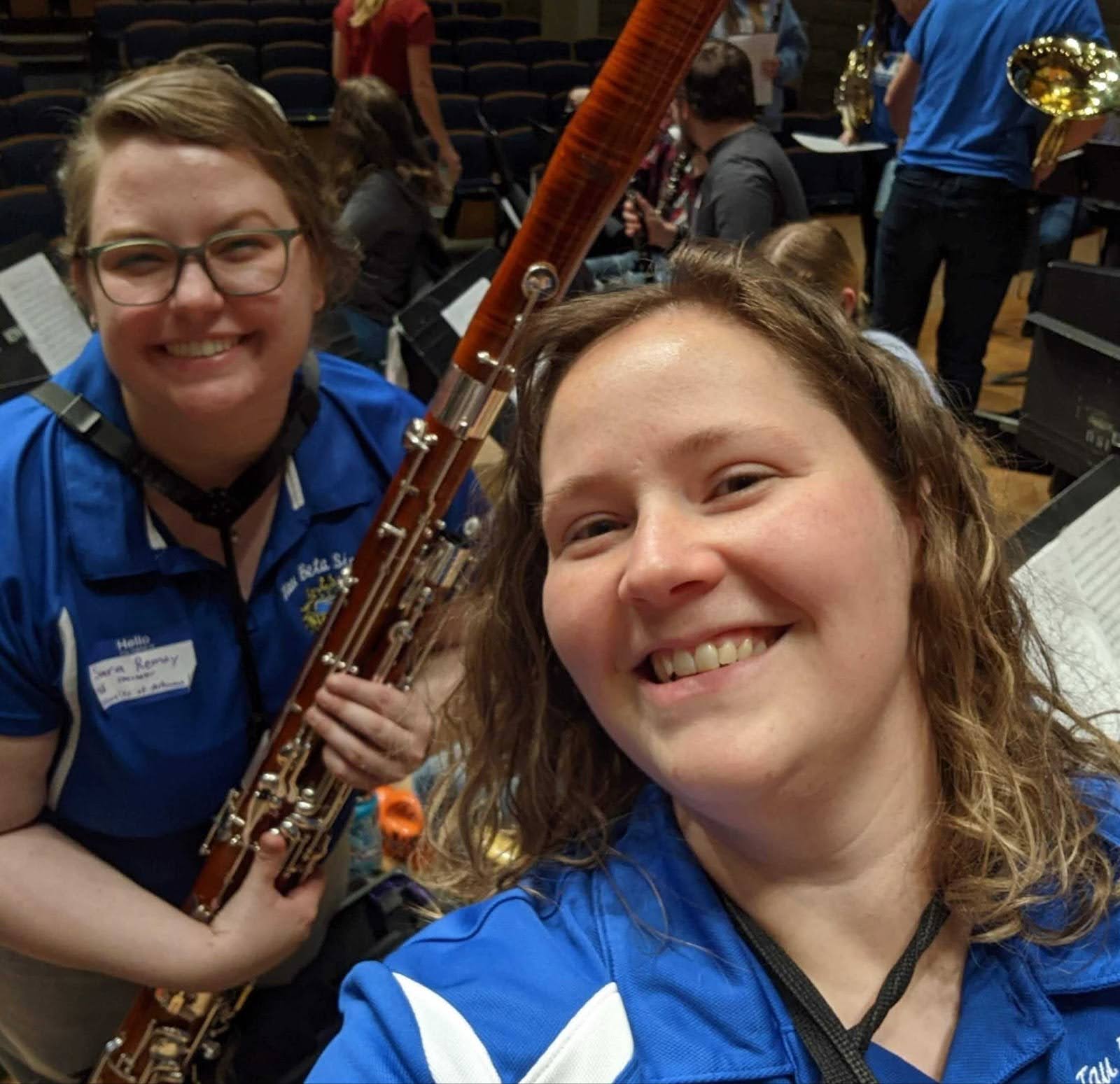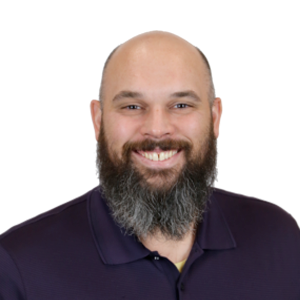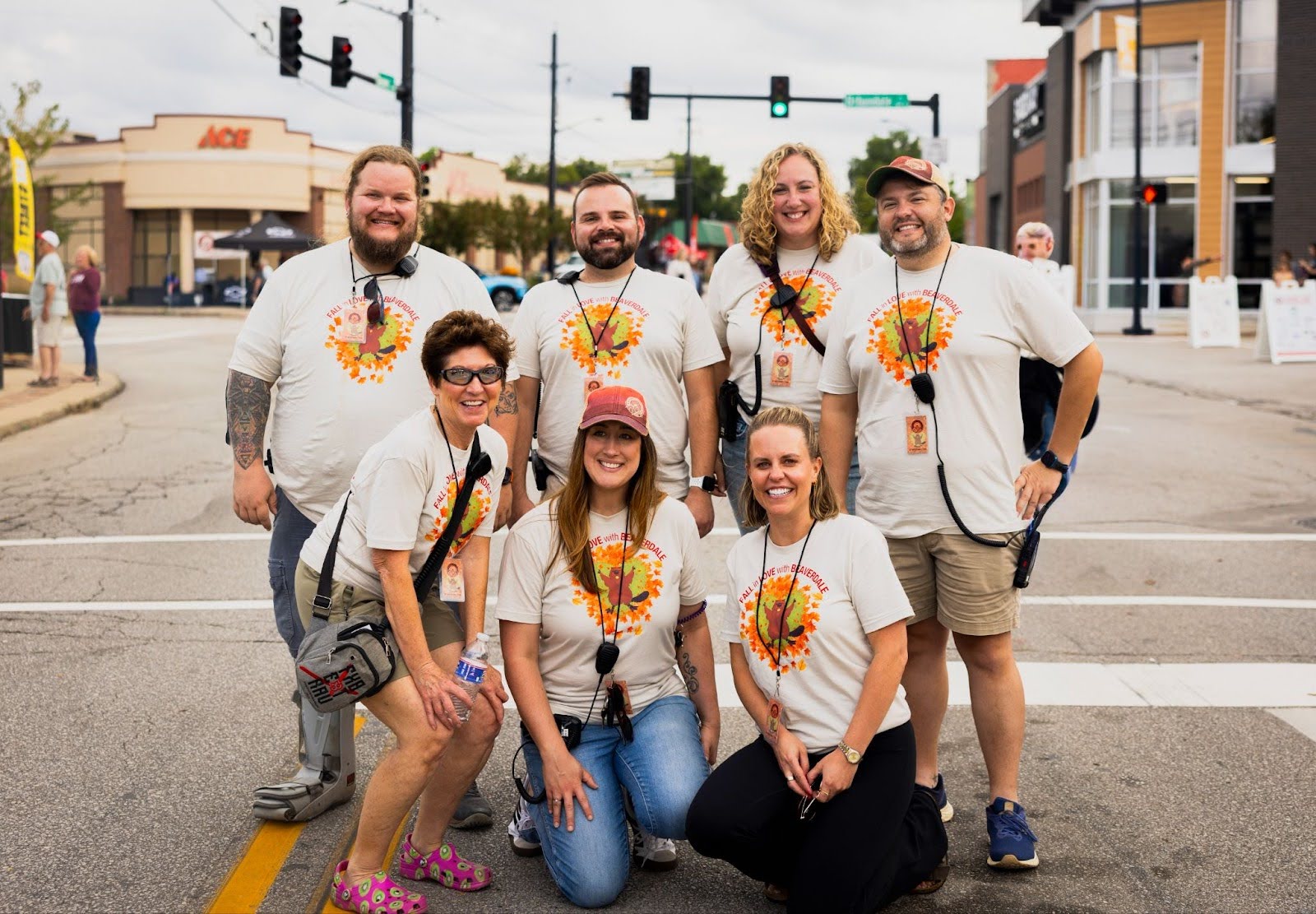Sharing Our Passion for Technology
& Continuous Learning
Community Service Highlights: spotlight on Source Allies employee contributions
The culture at Source Allies is founded around pursuing your interests and passions. Often, they lead us to build personal projects, continue our education, or form user groups to practice speaking and open new doors for growth. Sometimes, we’re able to use our skills and expertise to give back to the broader community: leveraging technical, management, and communication talents to support non-profits, bolster local organizations, and make meaningful impacts. Here are four stories from teammates who have paid it forward with their time and talent in the past year.
Drew Kinneer: Robotics Coach

The 10435 Circuit Breakers robot in action at the FTC Iowa Championship last year
This year, I began coaching a competitive robotics team, the Circuit Breakers, under a non-profit organization named Pathfinders Robotics. The team participates in a robotics competition called First Tech Challenge. Every year, teams of 7th-12th graders build and program a robot around a new game design. The teams’ robots must perform tasks with both autonomous and manual controls, accomplishing feats such as stacking cones, lifting themselves off the ground, or even shooting a paper airplane into a target zone! Whatever the challenge, teams must work together to design, build, and program their robot. Teams participate in a series of competitions throughout the year, with top qualifying teams across the globe competing in the World Championships. Last year, the Circuit Breakers qualified for the World Championships and traveled to Houston, Texas to compete!
I attend the team’s weekly meetings to assist the students, give feedback on their robot designs, and provide guidance for their programming solutions. I do code reviews of their commits to give general guidance on coding, and I use it as an opportunity to introduce new programming concepts and practices. Recently, we started doing online pairing/tutoring sessions to do deep dives into the code. The improvements I’ve seen in the students’ abilities are awesome. It’s great to see a student apply a concept that was previously unknown to them, like it was second nature.
The First Tech Challenge program offers an opportunity that is rarely seen in school. I love that students have to try, fail, and go back to the drawing board over and over again until, through the culmination of their effort, they create something that works. There’s no one way to build a robot, and it takes a lot of time and effort to find a solution that works. When I was in middle school and high school, I participated in the same robotics program for five years. During that time, I learned a great deal about the engineering process and found my passion for software development–leading to my career today. It’s been great to give back to a program that provided so much to both my technical and social development as a student.
Shalyn Nystrom: Data Analyst & Team Lead for Tau Beta Sigma

Shalyn Nystrom and Sara Remoy, Midwest District Counselors, participating in the Reading Band.
As a collegiate band geek who loves helping others, I was delighted to find a group of individuals with similar experiences. Tau Beta Sigma is a music-centered honor Sorority focused on providing service to collegiate bands, promoting equality and diversity, and empowering women in the band profession. While I’m no longer an active member of the organization, I’ve found many ways to serve the organization since graduation. In addition to serving as a committee member for our Alumni Association and overseeing the execution of five District Conventions, I’ve chaired the Assessment Committee for the past eight years.
Much like how my professional life benefited from the communication and soft skills I gained through my organization in college, my organization has benefitted from the data engineering, analytics, and project management skills I’ve gained through my professional life.
Some of the Assessment Committee’s projects have included analyzing results from our biennial Climate Survey and our post-event surveys, tracking year-over-year trends within our national programs, monitoring chapter health, and tracking membership levels. We also helped oversee the move from an on-prem database and user-facing system to Salesforce–which involved data modeling, data migration, and quality testing efforts. The National Council, Board of Trustees, and Alumni Association also make ad-hoc requests to the Assessment Committee in order to make data-informed decisions
Throughout my tenure on the Assessment Committee, we’ve been able to improve our programs and efforts to better support chapters and their operations. We’ve brought data to the forefront, and now receive questions from leaders each month that we answer through an analysis of our data. We’ve informed discussions and decisions around policy changes and helped make sure our organization will be around to serve collegiate bands for many years to come.
Andreas Christianson: DSM Hack(athon) Contributor

Andreas Christianson (in stock)
I sign up for DSM Hack every year. It started over a decade ago when one of my teammates floated the idea. I thought I was signing up for two days of fun, non-corporate coding, and one less day of work that week. I did successfully get a day off work, and I did write fun code, but that isn't what has kept me coming back.
One of the first hackathon projects I worked on was for a local food bank. They had a lot of donations, and a lot of clients, but very little information about what foods were being donated and what foods clients were seeking. We built an API to resolve UPCs and a database where they could enter incoming donations. We integrated into their point of sale system so that they could generate reports about the flow of goods through their system. As part of the hackathon, I met the receiving clerk for the food bank. He sat with our team throughout the hackathon, helping us understand the requirements and sharing the impact it would have. Our work over one weekend saved his team a hundred hours a month in work on spread sheets, moving stock, and inspecting nutritional labels.
This year I worked on a web site for a farming co-op. The site is open source, and multiple co-ops in Central Iowa use it. They needed changes that seemed impossible for the farm co-ops to get done: new icons, a favorites page, and quick-add buttons. I felt like a superhero giving them all those things on the first day and coming back for more on day two.
The hackathon staff is amazing, they keep us motivated and check in every couple hours. We’re even able to reach out and help other hackathon teams. I usually pair with a number of students, technologists, and consultants who all come for the same reason: to make a difference. Those personal connections and multipliers of my impact keep me coming back to DSM Hack each year.
Nick Aceto: President of the Beaverdale Fall Festival in Des Moines, IA

Nick Aceto (back row, second from left) with members of the Beaverdale Fall Festival Board of Directors at the 2025 festival
I serve as President of the Beaverdale Fall Festival, where I apply the same leadership and program management skills I use at Source Allies. Each year, my team and I coordinate hundreds of vendors, contractors, businesses, and volunteers to deliver a seamless community experience. I lead a ten-member board of directors, each owning a key function - logistics, marketing, sponsorships, and entertainment - and I represent the festival across Des Moines to strengthen partnerships and community ties.
The role requires systems thinking: anticipating risks, aligning stakeholders, and ensuring everyone moves toward a shared goal. Just as importantly, I focus on developing my team: helping each member succeed in their role and feel ownership in the festival’s success.
After COVID-19, the event was at risk of collapse. Together, the board and I rebuilt it into a stable nonprofit, applying lessons from past challenges to create a stronger foundation. We’ve grown attendance, expanded sponsorships, and deepened relationships with local businesses. The work demands time: often four or more hours a week, and far more as September approaches, but the results are visible. Each year, neighbors tell me it’s their favorite weekend, a reunion that brings the community together. Seeing families, kids, and longtime residents share that joy makes every hour worthwhile and always leaves me even more excited for the next year ahead.





